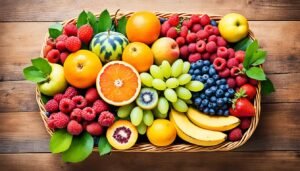Get our FREE E-Book HERE - 120 TIPS for Losing Weight & Bonus Tips for Postpartum Weight Loss & Dad’s Postpartum Experience
Can Fiber Help You Lose Weight? Discover Its Benefits

Tired of crash diets and weight loss methods that don’t last?
Fiber might just be the key for you.
It’s a game-changer in your weight loss journey.
The impact fiber has on losing weight is surprising!

Fiber comes in two main types, soluble and insoluble.
It dissolves in water or doesn’t, affecting our health differently.
Some soluble fibers can greatly improve your health, metabolism, and weight1. As it moves through your body, it gets to your good gut bacteria. They then convert it into energy you can use. So, can fiber help you lose weight?
Key Takeaways
- Soluble fiber may help promote weight loss by increasing fullness and reducing appetite.
- It plays a crucial role in maintaining a healthy gut microbiome and reducing inflammation.
- Viscous fibers like pectins and beta-glucans can effectively reduce food intake.
- Incorporating more high-fiber plant foods into your diet can be an effective weight management strategy.
- Fiber supplements like glucomannan may aid weight reduction in overweight and obese individuals.
Introduction to Fiber and Weight Loss
Fiber is key for managing weight. It’s a type of carb that can’t be broken down by gut enzymes1. There are two kinds: soluble and insoluble, and they each help the body in different ways.
What is Fiber?
Fiber is a carb that doesn’t get absorbed by the body1. Instead, it moves through your digestion, doing good things for your health as it goes.
Types of Fiber: Soluble and Insoluble
Insoluble fiber, like what’s in wheat bran and veggies, adds bulk to your stool. It helps keep you regular1. Soluble fiber, on the other hand, turns into a gel with water. This slows digestion and how your body absorbs nutrients. It helps you feel full longer, which is good for managing your weight2.
How Fiber Contributes to Weight Management
For weight loss, soluble fiber is very important. It makes you feel full, so you eat fewer calories2. Foods with soluble fiber, like certain fruits and oats, can make your stomach empty slower. This means you might not feel as hungry for a while after eating1. There’s even some proof that eating more fiber can help you lose dangerous belly fat linked to health issues1.
Men should try to eat between 30 and 38 grams of fiber each day. Women, on the other hand, should aim for 21 to 25 grams2.
Fiber Feeds Your Friendly Gut Bacteria

Your gut hosts a whopping 100 trillion bacteria, with most in the large intestine.1 This collective, the gut microbiome or gut flora, is vital for many parts of your health, like weight management.
The Gut Microbiome and Its Importance
The gut microbiome is like a tiny world that affects digestion, use of nutrients, and the immune system. It even helps keep the brain healthy. To stay well, it’s key to have a varied and balanced gut microbiome.
Prebiotic Fibers and Their Role
Prebiotic fiber is a special kind of carbohydrate that makes its way to the colon nearly unchanged. It becomes a feast for the beneficial gut bacteria once there. This process turns it into vital energy.1 Simply put, if you give the good gut bacteria prebiotic fiber, they thrive, and so do you.
Eating high fiber foods for weight loss can greatly help. This includes items like beans, lentils, and whole grains. They nourish the good gut bacteria and help with keeping a healthy weight. A diet high in prebiotic fiber also keeps your gut biome diverse and balanced. This is tied to better metabolic health and less chance of obesity-related problems.
Good Bacteria Help Fight Inflammation
Your gut is like a city, bustling with trillions of beneficial bacteria. We call this your gut microbiome.1 While some inflammation is good for us, too much can be bad. It’s linked to issues such as obesity.1 Eating plenty of fiber, which you get from good fiber foods for weight loss like beans, fruits, and whole grains, can boost the good bacteria. This helps fight against harmful inflammation.
Acute vs. Chronic Inflammation
When your body gets hurt or sick, it inflames to protect and heal itself. This is called acute inflammation. It’s a short event. But, chronic inflammation is different. It lasts a long time and can harm your body.1 Many serious health issues in the West are tied to this long-term inflammation.
Fiber’s Impact on Inflammatory Markers
Eating lots of fiber is linked to lower inflammation levels in our blood.1 Foods high in fiber, like oats, berries, and leafy greens, do this by feeding the good bacteria in your gut. This can help decrease the inflammation causing obesity and other health problems.
The link between gut bacteria and inflammation is complicated but important. Keeping our gut microbiome diverse and balanced is key for good health and managing weight. Adding good fiber foods for weight loss in your meals is a smart move. It helps the good bacteria grow. This might lower the risks of getting diseases tied to chronic inflammation.
Viscous Fiber May Reduce Your Appetite

The thickness of fiber is key inits weight loss benefits. Viscous soluble fibers, such as pectins and beta-glucans, thicken in water. They create a type of gel that slows stomach emptying. This makes you feel full longer and helps cut down on how much you eat.1
The Concept of Viscosity
Viscosity simply means how thick and sticky something is. A high-viscosity fiber makes you feel full. It does this by slowing the digestive process. So, you feel satisfied for more extended periods and may eat less.1
How Viscous Fibers Promote Fullness
Consuming certain fibers creates a gel in your gut. This happens with fibers found in pectins, beta-glucans, psyllium, glucomannan, and guar gum. Their gel makes your stomach empty slower and food move through your body at a slower pace. You’ll feel full longer, helping you eat fewer calories.1
Targeting Belly Fat Reduction
Vicious fibers are great for fighting belly fat linked to health issues. Research shows they can help reduce the risk of type 2 diabetes and heart disease by lessening this fat type. They work by making you feel full and possibly cutting your calorie intake, aiding in losing belly fat.12
Glucomannan fiber from the konjac root is seen as a good supplement. Yet, regularly eating viscous fiber through whole foods is advised for long-term weight control and better health.1
Can Fiber Help You Lose Weight?

Eating more fiber can aid in losing weight. Foods with soluble fiber — like a gel — help here. It’s a good weight loss strategy.
The Role of Soluble Fiber in Weight Loss
Not all fiber is the same. Soluble fiber slows digestion. It makes you feel full longer, reducing how much you eat. This shows it might help you lose weight.1
Studies on Fiber and Weight Management
A study discovered soluble fiber makes you feel fuller in 39% of cases. But, it cut food intake in just 22%. This viscous fiber trait is key.1 Some studies…2 show it targets belly fat.12 More research connects a high soluble fiber diet to staying lean or gaining less weight.12
Are Fiber Supplements Effective for Weight Loss?

Fiber supplements, like psyllium husk and glucomannan, can be good for you. But, the proof on whether they actually help with losing weight is mixed and not strong.1 There’s one big exception, though. Glucomannan, a very thick fiber from the konjac root, shows some real promise in helping people reduce weight. This is especially true for those who are overweight or obese.1
Glucomannan: A Promising Supplement
Glucomannan has gotten a lot of attention for possibly helping to reduce belly fat. Studies point to its ability to make you feel full longer and slow down how fast you digest food.2 When it’s in your stomach, this fiber turns into a gel-like substance. This can help you eat fewer calories and feel satisfied longer.1
Whole Foods vs. Supplements
Eating fiber from whole plant foods is usually better for weight control than taking fiber supplements.1 This is because, by themselves, supplements often don’t lead to big changes. They miss out on the many other good things whole foods have, like different nutrients. Foods that are rich in fiber, such as beans, legumes, asparagus, Brussels sprouts, and oats, are best. They provide a richer mix of good stuff than supplements do.1 So, it’s best to focus on getting your fiber from a variety of whole, plant-based foods, rather than only relying on supplements.
Rich Sources of Viscous Fiber

Viscous fibers are found only in plant foods. Some great sources are beans, legumes, and flaxseeds. Also, try asparagus, Brussels sprouts, oats, and some fruits.1 If you want to eat more fiber, do it slowly. This helps avoid stomach problems like cramps and diarrhea.
Plant-Based Foods High in Viscous Fiber
Adding high-fiber plant foods to your meals is smart. You get more soluble fiber this way. Here are some top picks:
- Legumes like lentils, black beans, and chickpeas
- Oats and oat bran
- Flaxseeds and chia seeds
- Fruits such as oranges, apples, and berries
- Vegetables like Brussels sprouts, asparagus, and sweet potatoes
Tips for Increasing Fiber Intake Gradually
Up your fiber intake slowly. Your body needs time to get used to it.3 If you add a lot at once, you might feel bloated. This could make you quit your high-fiber plan. So, start small, and add more over time.
Drink lots of water when you add fiber. Also, eat probiotic foods such as yogurt. They help your digestion. By being patient and steady, you can enjoy a high-fiber diet. It could help with weight loss and make you healthier overall.
Fiber and Gut Bacteria Diversity

Eating more soluble fiber means you might have less chance of getting sick. This includes diseases like type 2 diabetes and heart problems. Research shows people who eat a lot of soluble fiber have many different types of good bacteria in their guts.4
Recent studies have shown a connection between having diverse gut bacteria and lower belly fat risk. But, scientists say more studies are required to fully understand this link. They also found that keeping a variety of gut bacteria might help prevent gaining too much weight over time.4
The Link Between Bacterial Diversity and Belly Fat
In a study, nine types of gut bacteria were linked to gaining weight. This link held even after considering other factors like family and lifestyle. Those gaining the most weight were in the top third, while the least weight gainers were in the bottom third.4
How Gut Bacteria Digest Soluble Fiber
When you eat soluble fiber, it goes to your gut. There, certain bacteria break it down. This process makes short-chain fatty acids, which could reduce belly fat.4 The study also checked how much soluble fiber and saturated fats people ate. It made adjustments for the number of calories they took in. Fiber and fatty acid intakes were looked at with different measures of diversity, to see their effects closely.4
Soluble Fiber and Appetite Suppression

Soluble fiber can help with weight loss by making us feel full. It does this by lowering the hunger hormone ghrelin. It also boosts the hormones that tell our brain we’re full, like cholecystokinin and GLP-1.
This fiber makes nutrients like food release and absorb slowly in the gut. This slow process lessens our feeling of hunger. So, by eating foods rich in soluble fiber, we naturally eat less.
Hormonal Regulation of Appetite
Specific types of soluble fibers, including pectins and beta-glucans, create a gel in our stomachs. This gel slows down the digestion of food, keeping us full for longer and reducing our desire to eat.1 A scientific study noted that the thick texture of dietary fibers is crucial for controlling how hungry we feel and how much we eat.5
Slowing Digestion and Nutrient Absorption
Research shows that certain types of fiber, which make us feel full, are more effective than others. For example, fiber that forms a gel decreases hunger best, while not all fibers reduce food intake.1 In a test, a high-viscosity fiber supplement, when added to low-calorie meals, helped overweight and obese women feel less hungry and fuller longer. This shows the power of certain fiber types in managing weight via appetite control.5
Incorporating Soluble Fiber into Your Diet
Men are advised to get 30-38 grams of fiber daily, and women should get 21-25 grams.2 Start by adding fiber to your diet slowly. This helps avoid gas, bloating, and digestive issues.6 Your body needs time to get used to it.7 Also, combine a high-soluble fiber diet with other healthy habits for the best results in managing weight.
Recommended Daily Fiber Intake
It’s suggested that women have 25 grams and men 38 grams of fiber every day. If you take more than 50 grams, it might affect how well your body absorbs calcium.6 According to the Institute of Medicine, men under 50 should have 38 grams, women under 50, 25 grams, and for those over 50, men should consume 30 grams, and women 21 grams.7
Potential Side Effects of Rapid Fiber Increase
Adult women need at least 25 grams of fiber daily. But, it’s important to add fiber little by little to prevent stomach problems.6 Eating too much fiber can cause gassiness and bloating. To avoid these, slowly increase your fiber intake and drink lots of water.
Conclusion
Adding more viscous, soluble fiber from plant-based foods in your diet is a valuable step for weight loss and improved metabolic health. This fiber helps good gut bacteria to grow. They lower inflammation and control your hunger89. Studies show these fibers could help cut down on dangerous belly fat linked to health problems9.
But, you need to do more than just eat a lot of fiber. It’s key to also eat balanced, watch your calories, and stay active. Get your fiber from whole, fiber-rich foods like fruits and veggies, beans, and whole grains. This is better than only taking supplements810.
By upping your soluble fiber, you might eat less and find it easier to stick to your diet. But, remember, it’s all about a full plan. This plan should include eating the right amount, regular exercise, and choosing foods that give you lots of nutrients89. Focus on small, steady changes and picking foods rich in fiber. This way, you can reach your weight goals and boost your health and happiness at the same time.
FAQ
Can fiber help you lose weight?
How does fiber contribute to weight management?
How does fiber impact gut bacteria?
Can fiber reduce inflammation?
What is viscous fiber and how does it promote fullness?
Can fiber specifically target belly fat?
Are fiber supplements effective for weight loss?
What are good sources of viscous fiber?
Source Links
- https://www.healthline.com/nutrition/fiber-can-help-you-lose-weight
- https://www.healthline.com/nutrition/fiber-and-belly-fat
- https://www.yahoo.com/lifestyle/women-over-50-losing-100-085213323.html
- https://www.ncbi.nlm.nih.gov/pmc/articles/PMC5500185/
- https://www.ncbi.nlm.nih.gov/pmc/articles/PMC3342503/
- https://www.prevention.com/weight-loss/a33382312/fiber-for-weight-loss/
- https://www.mayoclinic.org/healthy-lifestyle/nutrition-and-healthy-eating/in-depth/fiber/art-20043983
- https://www.medicalnewstoday.com/articles/146935
- https://www.ncbi.nlm.nih.gov/pmc/articles/PMC5331580/
- https://www.ncbi.nlm.nih.gov/pmc/articles/PMC6768815/








